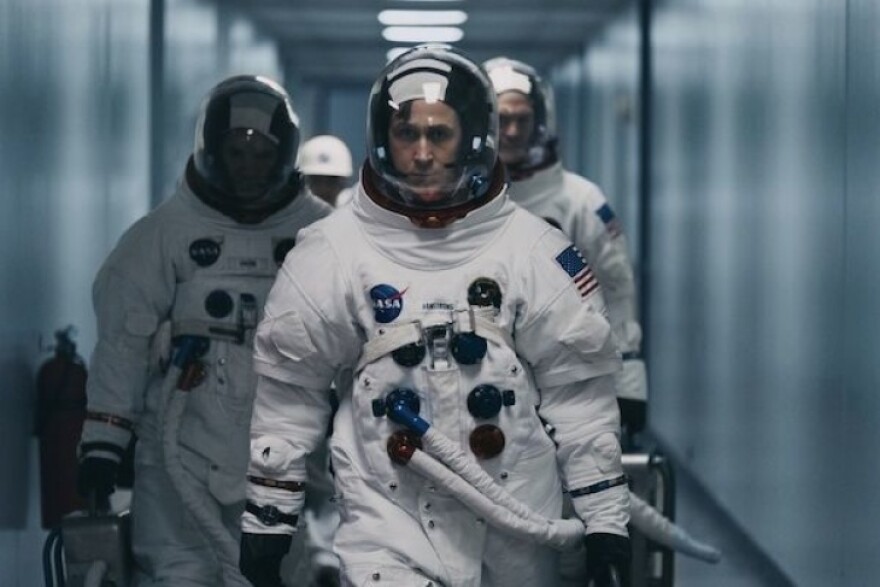With our free press under threat and federal funding for public media gone, your support matters more than ever. Help keep the LAist newsroom strong, become a monthly member or increase your support today.
Why Ryan Gosling Pushed For 'First Man's' Most Devastating Scene

By Monica Bushman with John Horn
How do you make a compelling film about one of the most famous success stories of all time?
It's well-known that astronaut Neil Armstrong was the first man to walk on the moon. He stepped off the ladder of the lunar module on July 20, 1969 and declared, "That's one small step for man, one giant leap for mankind."
It may seem like there's not much to say beyond that, but First Man director Damien Chazelle (La La Land) and screenwriter Josh Singer (Spotlight) found a lot more. They set out to tell the story behind the story we all think we know. The end result: a film about failure, loss, and sacrifice.
"We know that [Armstrong] landed on the moon, but I don't think people really know, or perhaps appreciate, how he got there and how difficult it was and how costly it was -- not just to him, but to his family, the people he knew," Chazelle told KPCC's The Frame. "This was not an achievement that came easily."
Armstrong, like most of his fellow early '60s NASA astronauts, was a former wartime pilot and later a test pilot -- he flew out of Edwards Air Force Base in Southern California. Those experiences meant that those men came into NASA "with a great awareness of their proximity to death," Chazelle said. The astronauts and their families understood that every time they set out on a flight, mission, or training exercise, they might not come back alive.
Armstrong was part of what was known as "The New Nine," the second group of astronauts selected by NASA in 1962.
"There were nine guys, two of them died. And [Elliot See and Ed White] turned out to be the two that Neil was closest with, which I think not many people knew," Singer said. "And those aren't great odds."
What's also not widely known about Armstrong: he had a daughter, Karen, who died of brain cancer when she was just 2 years old. She died in 1962, the same year Neil Armstrong was accepted into the space program.
Although Armstrong eventually spoke with historian James R. Hansen (who wrote the biography First Man) about the tragedy, most of the people he worked with never knew he even had a daughter.
In the film, one of the early scenes is of Armstrong (played by Ryan Gosling) breaking down in tears alone in a room after his daughter's funeral.
That scene grew out of an idea that Gosling had about Armstrong's motivation for wanting to go to the moon, Chazelle said.
"I think I was looking at the story primarily as a story about a goal and the cost of a goal. Sort of what you're running to, as opposed to what you're running from," Chazelle said. "And Ryan I think, more than anything, gravitated towards what Neil was running from."
Karen's death is a central part of the story.
"It was actually Ryan I think who pushed us to show Neil actually immediately emote in a sort of outward way, even though it's very hidden from everyone else, upon the death of his daughter," Chazelle said. "And to try to create a sort of a primal scene there that's going to drive you eventually to the moon."
While we all know now that the moon landing was a success, Chazelle and Singer said they hope First Man adds something to the story by shattering the myth that it was somehow easy, and reminding people that at one point, it seemed impossible.
"We have so many great big challenges that we face as humans right now -- I think climate change is a good example of that, where it seems like this impossible problem," Singer said. "And I think in some ways the myth around NASA has done us a bit of a disservice. Because by sugar-coating everything, by not showing the failures and focusing on the failures and the loss and the sacrifice, we think Oh well it came easy, and there were these superheroes who just did it."
When you realize instead that it was "normal men and women working very, very hard, sacrificing, and failing," Singer said, "to me that's more inspiring because it tells me I'm going to have to sacrifice, we're all going to have to sacrifice to solve these problems."
First Man opens in theaters Friday, Oct. 12.
Correction: An earlier version of this story misstated the date of the moonlanding. LAist regrets the error.
You made it! Congrats, you read the entire story, you gorgeous human. This story was made possible by generous people like you. Independent, local journalism costs $$$$$. And now that LAist is part of KPCC, we rely on that support. So if you aren't already, be one of us! Help us help you live your best life in Southern California. Donate now.








